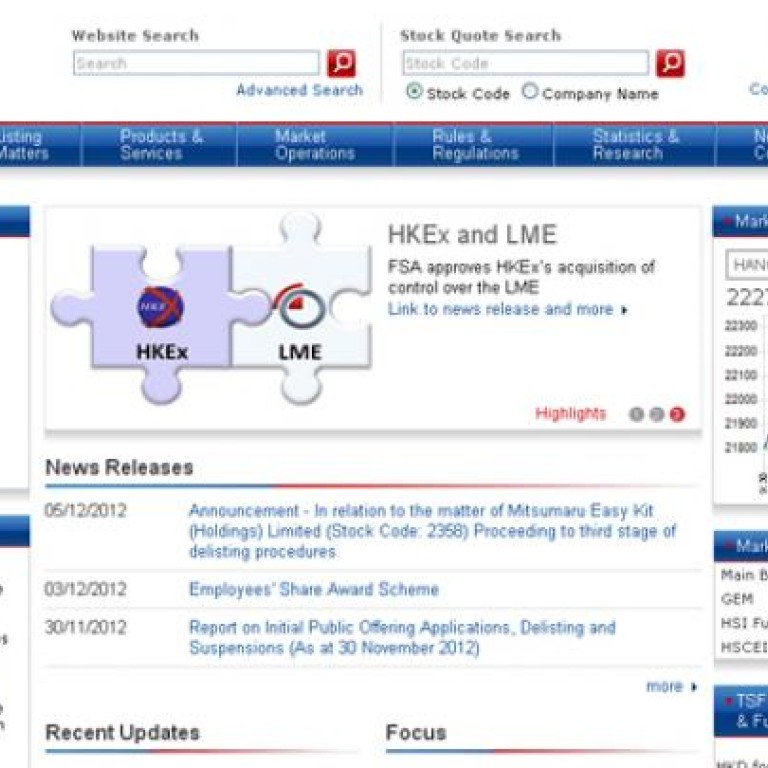
Hang Seng up 2.2pc to 16-month high on banks, insurers
The Hang Seng Index closed at its highest level since August last year on Wednesday, after China allowed insurers to invest more in banks.
Hong Kong stocks rose, with the benchmark index closing at its highest level since August last year, after China’s government allowed insurers to invest more in banks and after the nation’s new leaders pledged to maintain growth and promote “urbanisation.”
Ping An Insurance (Group) rose 4.9 per cent as HSBC Holdings said it agreed to sell its stake in China’s second- biggest insurer. Industrial & Commercial Bank of China, the world’s largest lender by market value, climbed 2.5 per cent. China Resources Land, a state-controlled developer, gained 2.5 per cent. Bank of East Asia Limited, Hong Kong’s largest family- run lender, advanced 2.2 per cent after agreeing to sell new stock to Japan’s Sumitomo Mitsui Banking.
The Hang Seng Index rose 2.2 per cent to 22,270.91, its highest close since August 2, last year. All companies in the 49-member gauge advanced, with trading volume 77 per cent above the 30-day average for the time of day, according to data compiled by Bloomberg. The Hang Seng China Enterprises Index of mainland companies climbed 2.9 per cent to 10,830.04, the biggest gain since September 14.
“There’s a lot of talk about potential policy support for China’s economy,” said Tim Leung, a fund manager who helps manage about US$1.5 billion at IG Investment. “While urbanisation is not new, people will probably be focusing on that trend. There’s a lot of positive benefit from urbanisation, like infrastructure spending.”
Hong Kong’s benchmark index advanced 20 per cent through yesterday from this year’s low on June 4 as central banks added stimulus and China and the US showed signs of economic recovery. Shares on the measure traded at 11.4 times average estimated earnings yesterday, compared with 13.5 for the Standard & Poor’s 500 Index and 12.5 for the Stoxx Europe 600 Index, according to data compiled by Bloomberg.
“The Hang Seng Index may surpass the key resistance level of 22,200 from capital inflow into Hong Kong and the likely bottoming out of China’s economy,” said Patrick Yiu, associate director at Cash Asset Management in Hong Kong. “It’s giving a clear and better picture for investors to invest in Hong Kong. The Hang Seng Index may have a chance to test a higher resistance level.”
The Hong Kong-listed iShares FTSE China A50 Index ETF, which tracks the 50 largest domestically listed Chinese companies, gained 4.4 per cent with volume more than double the five-day average at the time of the day, according to data compiled by Bloomberg. The ETF rose the most since January 17.
Futures on the Standard & Poor’s 500 Index rose 0.3 per cent today. The S&P 500 lost 0.2 per cent yesterday as President Barack Obama said the Republican offer on resolving the so- called fiscal cliff doesn’t go far enough and won’t raise the revenue needed to shrink the US deficit by US$4 trillion over the next decade.
Ping An jumped 4.9 per cent to HK$60.50, the biggest gain in the Hang Seng Index. HSBC, which rose 1.7 per cent today, said it will sell its entire stake for US$9.4 billion at HK$59 a share to Thailand’s Charoen Pokphand Group, removing investor uncertainty. The sale price compares with yesterday’s closing price of HK$57.65.
Other insurers rose. China Life Insurance, the country’s biggest insurer, advanced 4.2 per cent to HK$23.45, while New China Life Insurance Co. surged 8.3 per cent to HK$26.05.
China has abolished a regulation on insurance companies’ investment limits in commercial banks, according a statement posted on the China Insurance Regulatory Commission’s website yesterday.
ICBC gained 2.5 per cent to HK$5.30, while China Minsheng Banking, a commercial bank, rose 5.1 per cent to HK$7.99.
Bank of East Asia increased 2.2 per cent to HK$30.35. The shares rose even after agreeing to sell new stock to Sumitomo Mitsui Banking, raising HK$3.3 billion (US$426 million) to bolster its capital as it seeks to expand in mainland China.
Chinese developers and cement companies rose after Xinhua News Agency yesterday said China will expand domestic demand and actively promote urbanisation to encourage more people to move to cities. Separately, China National Radio reported yesterday China will focus on simplifying taxes on property transactions. That may lead to cheaper property transaction taxes, the report said, citing comments by Liu Heng, a scholar with the Central University of Finance and Economics.
“Lately the government had been relaying messages about improving the economy, in particular its plans for urbanisation,” said Mao Sheng, an analyst for Huaxi Securities in Chengdu, China “We can see construction, cement, property companies leading stock gains as we see a clearer direction and roadmap for government reforms.”
Developers Rise
China Resources Land, a state-controlled developer, climbed 2.5 per cent to HK$20.70 after Macquarie Group said it may record higher sales. Evergrande Real Estate Group Ltd., a builder that gets all its revenue from China, jumped 8.9 per cent to HK$4.09 after reporting sales from January to November were 5.8 per cent higher than its annual target for this year. Anhui Conch Cement, China’s biggest cement maker, gained 5 per cent to HK$27.30.
Futures on the Hang Seng Index gained 2.8 per cent to 22,340. The HSI Volatility Index rose 3 per cent to 16, indicating traders expect a swing of 4.6 per cent for the equity benchmark in the next 30 days.

